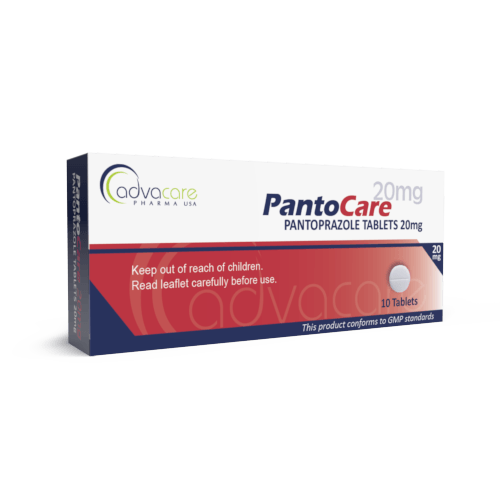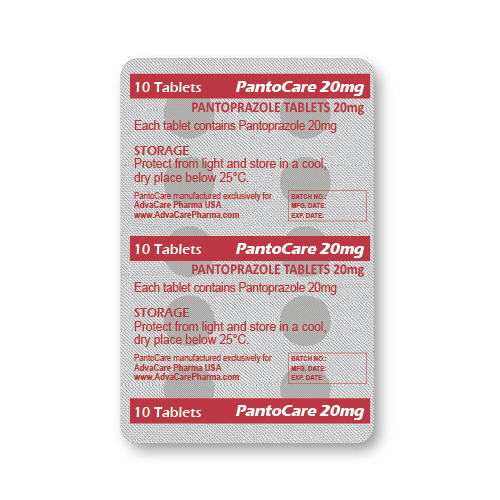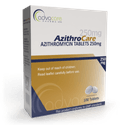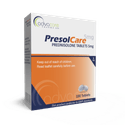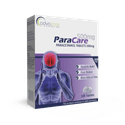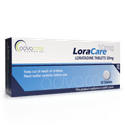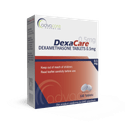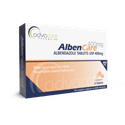- Home›
- Pharmaceuticals›
- Pharmaceutical Tablets›
- Pantoprazole Tablets
Pantoprazole Tablets
Dosage
Packaging
What is Pantoprazole?
Active Ingredients: Pantoprazole
Pantoprazole Tablets are a drug used to reduce the production of stomach acid. It is effective at relieving symptoms like heartburn, persistent cough, and difficulty swallowing that are caused by gastroesophageal reflux disease (GERD), Zollinger-Ellison syndrome, and other similar conditions.
Pantoprazole can help with healing acid damage to the stomach and esophagus and has been known to prevent ulcers.
Pantoprazole is in a family of medications called proton pump inhibitors. The active ingredient works by inhibiting the H+/K+-ATPase system, therefore blocking stomach acid secretion. Proton pump inhibitors typically take up to 4 days to reach full efficiency.
Pantoprazole Tablets are produced with a dose of 20mg or 40mg. The tablets are packaged on blisters and are available for distribution as boxes of 10 tablets.
This medication is produced and exported by AdvaCare Pharma. These Pantoprazole Tablets are manufactured in our facilities in China, India, and the USA. Our production facilities are GMP certified and are regularly inspected to ensure they meet health, safety, and environmental standards.
Why are we a top Pantoprazole manufacturer?
AdvaCare Pharma is a trusted Pantoprazole manufacturer committed to providing quality-assured, cost-effective pharmaceuticals for an ever-changing global market. Manufacturing a wide range of 200+ pharmaceutical products in tablet form, we ensure that all of our oral solid dosage forms adhere to stringent GMP standards.
We operate according to a unique "vested supplier-distributor relationship" business model, in which we tie our success in a market to that of our distributor. Such a model facilitates a closer relationship by working together to achieve pre-defined goals for market entry and expansion. As a Pantoprazole manufacturer and global supplier, we implement unique strategies to ensure successful distribution.
Uses
What is Pantoprazole used for?
It is used to reduce acid in the stomach. It’s used to treat conditions such as:
- erosive esophagitis
- gastroesophageal reflux disease (GERD)
- pathological hypersecretory conditions, including Zollinger-Ellison syndrome
Pantoprazole is sometimes used to treat duodenal or gastric ulcers or in combination with an antibiotic to treat Helicobacter pylori infection.
How are Pantoprazole Tablets used?
This medication is intended to be taken orally. Pantoprazole Tablets should be taken in the morning, either with meals or a glass of non-carbonated water. The tablets should not be cut, crushed, or chewed.
What dose should be taken?
Recommended dosage of Pantoprazole may vary based on different medical conditions and age.
Adult Dosing Recommended dosage may vary based on different medical conditions:
- For GERD (erosive esophagitis) as a short-term treatment, the usual dose is 40mg taken each day. The duration of treatment is 4-8 weeks.
- For GERD (erosive esophagitis) as maintenance treatment, the usual dose is 20-40mg taken each day.
- For GERD (non-erosive, symptomatic) (off-label), the usual dose is 20mg taken each day. The duration of treatment is 4 to 8 weeks.
- For hypersecretory conditions, including Zollinger-Ellison syndrome, the usual dose is individualized and taken 1-2 times per day. The starting dosage is 40mg taken 2 times per day. Doses of up to 240mg per day have been used for some patients.
- For H. pylori infection (off-label), the usual dose is 40mg taken 2 times per day. The duration of treatment is 10-14 days. Pantoprazole is part of a multi-drug therapy.
Renal Dosing No adjustments are recommended for patients with renal impairment or who are on HD/PD.
Hepatic Dosing No adjustments are recommended for patients with hepatic impairment.
Pediatric Dosing For GERD (erosive esophagitis), the usual doses for children over 5 years old are as follows:
- body weight of 15-39kg: 20mg taken once per day for up to 8 weeks
- body weight of > 40kg: 40mg taken once per day for up to 8 weeks
For H. pylori infection (off-label), the usual doses are as follows:
- body weight of 15-24kg: 40mg taken 2 times per day; the duration for treatment is 10-14 days.
- body weight of 25-34kg: 60mg taken 2 times per day; the duration for treatment is 10-14 days.
- body weight of > 35kg: 80mg taken 2 times per day; the duration for treatment is 10-14 days.
Renal Dosing for pediatrics No adjustments are recommended for children with renal impairment or who are on HD/PD.
Hepatic Dosing for pediatrics No adjustments are recommended for children with hepatic impairment.
Refer to a doctor or pharmacist for guidelines on dosage. Do not exceed what they advise.
What happens if a dose is missed?
When a dose is forgotten, it should be taken as soon as possible. If is within 4 hours of the next scheduled dose, skip the missed dose. Never take 2 doses at the same time.
How quickly does Pantoprazole relieve symptoms?
Pantoprazole does not offer immediate relief from reflux symptoms, such as heartburn. Symptoms should start to improve after 2-3 days of beginning treatment. It may take up to 4 weeks for the medication to work as intended.
Can antacids be used when taking Pantoprazole Tablets?
OTC antacids can be taken while being treated with Pantoprazole. It is recommended to take these either 2 hours before or after taking Pantoprazole. It is not advised to avoid taking other PPIs or H2 antagonists, such as famotidine, unless under the guidance of a doctor.
Can Pantoprazole be abruptly stopped?
It is not advised for patients taking a PPI for longer than 6 months to suddenly stop taking the medication. This may cause rebound hypergastrinemia. When discontinuing long-term treatment, it is advised to consult a healthcare professional for a tapering schedule.
Who can use Pantoprazole?
Pantoprazole Tablets can be given to adults and children, but caution is advised for specific groups of patients.
Pregnant This drug is not recommended for pregnant women, the benefits must be weighed against the risks. Conflicting human data suggests a possible risk of teratogenicity.
Breastfeeding There is not enough information concerning the risks of infant harm while a woman is using this drug. It is unknown whether Pantoprazole passes in milk.
Children Pantoprazole is indicated for erosive esophagitis in children over 5 years old. The safety and efficacy have not been outlined for pediatric patients under 5 years old.
Other warnings
Pantoprazole is associated with an increased risk of infections, including Salmonella and Campylobacter.
Pantoprazole and other PPIs may increase the risk of developing Clostridium-difficile-associated diarrhea (CDAD).
Cutaneous lupus erythematosus (CLE) and systemic lupus erythematosus have been reported in patients undergoing treatment with PPIs. Most symptoms improve within 4-12 weeks of discontinuing the drug.
Acute interstitial nephritis, severe cutaneous adverse reactions with eosinophilia and systemic symptoms (DRESS), and acute generalized exanthematous pustulosis (AGEP) have been reported.
Pantoprazole may be associated with an increased risk of osteoporosis-related fractures.
Treatment with Pantoprazole may cause false positive results for neuroendocrine tumors.
Side Effects
As with all pharmaceutical medicines, some unwanted effects can occur from the use of Pantoprazole Tablets.
Common side effects include, but may not be limited to:
- headache
- diarrhea
- nausea or vomiting
- stomach pain
- dizziness
- joint pain
- cold-like symptoms, fever, or rash (in children)
Call a doctor if symptoms such as the following develop:
- bloody or watery diarrhea
- severe stomach pain
- sudden pain in the hip, wrist, or back
- signs of a kidney problem, such as loss of appetite, urinating less than usual, bloody urine, or weight gain
- signs of low magnesium, such as irregular or fast heart rate, muscle cramps, muscle spasms, jitteriness
- new or worsening lupus symptoms
The long-term usage of Pantoprazole may cause some effects, such as:
- fundic gland polyps
- vitamin B12 deficiency
- hypomagnesemia
For a comprehensive understanding of all potential side effects, consult a medical professional.
If any symptoms persist or worsen, or you notice any other symptoms, please call your doctor.
Precautions
Do NOT take Pantoprazole Tablets if:
- You are allergic to pantoprazole or any of the other ingredients.
- You are allergic or hypersensitive to other proton pump inhibitors, such as lansoprazole or omeprazole.
- You are taking a medicine containing rilpivirine.
Possible interactions may occur with other pharmaceutical products. Consult with a doctor or pharmacist about any medications you are taking before starting your treatment. There are known possible interactions between pantoprazole and drugs such as digoxin, methotrexate, or diuretics. This is not a complete list.
Special considerations or alternative doses may be necessary for people with certain conditions, such as:
- low levels of vitamin B12
- low magnesium levels
- lupus
- osteoporosis
- pregnancy or breastfeeding
- kidney disease
The long-term use of pantoprazole may lead to a vitamin B12 deficiency. It is important to talk to your doctor if you experience any symptoms of vitamin B12 deficiency, such as headache, dizziness, stomach pain, or joint pain.
It is not advised to use anti-diarrhea drugs while taking pantoprazole. Diarrhea may be a sign of an infection. It is advised to talk to a doctor if watery or bloody diarrhea develops.
This medication may interfere with the results of certain medical tests and urine drug screening tests. It is important to inform laboratory staff about your treatment with pantoprazole.
Pantoprazole may cause dizziness or blurred vision. It is important to avoid driving or operating machinery until it is clear how this medicine affects you.
References
Meta-analysis of the efficacy and safety of pantoprazole in the treatment and symptom relief of patients with gastroesophageal reflux disease – PAN-STAR
The aim of this study was to evaluate the efficacy of pantoprazole in treating patients with erosive reflux disease (ERD) and non-erosive reflux disease (NERD), focusing on symptom relief and quality of life.
Three multicenter, prospective, open-label phase IV trials conducted in Slovenia, Poland, and the Russian Federation formed the basis of this meta-analysis, comprising 252 GERD patients treated with pantoprazole 40mg once daily for 4 or 8 weeks.
Symptom severity was assessed on a scale from 0 to 3, and quality of life was rated on a scale from 1 to 10. Results showed that 45% of patients met healing criteria after 4 weeks, increasing to 70% after 8 weeks. Even patients who did not fully meet healing criteria reported significant symptom reduction. The response to 8-week treatment was higher in ERD patients (76%) compared to NERD patients (64%). Discontinuation of treatment after 4 weeks did not worsen symptoms or affect quality of life.
Pantoprazole treatment improved symptoms and quality of life over 8 weeks and demonstrated benefits for patients with persisting symptoms. Pantoprazole 40mg was well tolerated, with over 90% of patients experiencing no adverse events throughout the study.
The conclusion of this meta-analysis supports the effectiveness and tolerability of once-daily pantoprazole 40mg in providing symptom relief.
You might be interested in...
Why AdvaCare Pharma?
As an industry leader, we are aware of our responsibility to provide affordable and sustainable solutions to improve healthcare worldwide.
